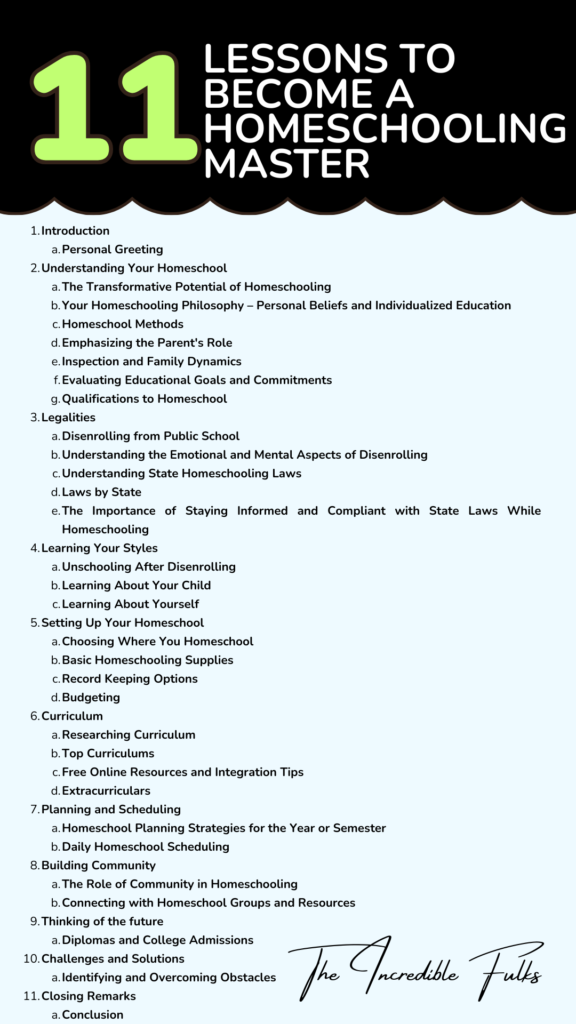Welcome back to the next article in my “How to Start Homeschooling” Series. This is Part 4 where I will be covering the legalities of homeschool, as well as how to disenroll your child from the public school system. If you are just getting here and haven't gone through the previous articles in the series, then be sure to head to our How to Start Homeschooling Series page or go straight to Part 1. Without further ado, lets get into it.
Introduction
The legalities of homeschool is where a lot of parents get tripped up, overwhelmed, and scared off. It doesn't have to be so scary and hard though. Homeschooling is legal in EVERY state in America. However, each state has different requirements for homeschooling.
In Alaska, there is ZERO record keeping nor oversight requirements. You don't even need to tell them your child is school age or anything. You just start and go. However, here in South Carolina, there are 3 options to choose from with the easiest being option 3. This option allows you to join an association where they take care of any and all reporting to the state. All you are required to do is tell them which of your kids you're homeschooling, their grade level, and if you are maintaining basic records. Basic records include subjects taught and a minimum attendance of 180 school days a year.
In this article, I hope to ease your mind about the legalities of homeschool, impress on you the importance of staying compliant with your local laws, and give you some guidance on how to disenroll your child from the public school system.
Understanding General Legal Considerations
Homeschooling, while legal in all 50 states, comes with a variety of legal obligations that can differ significantly from one state to another. These can include compulsory attendance ages, specific subjects to be taught, and assessment or evaluation requirements. Here is a glossary of common terms that you might encounter when filing as a homeschooler.
Terminology
- Compulsory age- the age in which your child is required to be enrolled in school
- Testing, Assessment, or Evaluation – usually a state certified exam that is given to your child by a certified proctor to ensure your child is progressing in homeschool. Some states accept noncertified assessments.
- Required English teaching- the requirement to have the majority of your homeschool be taught in the English language.
- Superintendent- the administrator who works at your local education office. This is who most homeschoolers report to for submitting documents.
- Letter of Intent- the written communication that you will be homeschooling your child. This usually includes your address, your child's info, subjects to be taught, and sometimes curriculum you will be using.
- Portfolio – a summary of your child's work over the past school year. This usually includes all tests, samples of writing, samples of art work, pictures or records of extra curriculars, and anything else you deem educationally important.
- Individualized Home Instruction Plan (IHIP) – This is similar to a letter of intent however it just lists your info and the curriculum you will be using to teach the required subjects.
Finding Your State's Laws
There are many resources to get help with your specific state laws. You can always google “homeschool laws in [STATE]” and it will show your local state's government website with their current homeschooling laws. If the site isn't very user friendly (as many government websites aren't), then going to a site that can summarize things for you can be so helpful! HSLDA is a commonly used business that not only helps you navigate everything related to homeschool legalities, but you can even purchase homeschool protection insurance for when you're facing real homeschool legal problems. They will advocate for you with real lawyers.
With all this legal talk, do you know what else is legal now? CBD Oil…..If all this legal talk is stressing you out, try Laguna Herbals Stress Free CBD Oil! It is quick and easy to roll it on, plus when you sign up for their newsletter, you'll get a 25% off coupon!
Broad spectrum CBD oil plus herbal actives will leave you feeling moisturized, reduce pain and inflammation. Our proprietary blend of essential oils will create a warming sensation to ease tension, simply roll it on. The roller ball application makes it easy to target specific areas of pain and tension.
*Each 2oz bottle contains 200mg of CBD oil (broad spectrum, cultivated in the USA)
The Importance of State-Specific Laws
No two states have identical homeschooling laws. Some may require annual notification, while others demand curriculum approval or standardized testing at regular intervals. You need to understand exactly when and how you should be reporting your homeschool records. This not only ensures compliance but also empowers you to make informed decisions about your homeschooling approach, from choosing curriculums to planning assessments. If you know that your state requires yearly attendance reports, hourly tracking, and grades, then you should probably use a program that helps keep track of those things.
I use Homeschool Planet for my planning and record keeping. They keep track of my curriculum resources, the assignments my kids do, the time we took to do the lesson, the daily attendance, the grades, and A LOT more. They will even generate a report card and transcript for me.
Common Problems I've Encountered
One of the biggest problems I've seen people encounter is when their state requires grades, but your curriculum doesn't give a way to grade it. Then the struggle is, how do we give grades to work that isn't really gradable. Instead of struggling to do this at the last minute, you should find a curriculum that includes regular quizzes or checks on knowledge. You can even use the publisher's placement exam as a way to grade and keep track of progress.
Another problem I've seen is parents will submit their letter of intent the first year they start homeschooling, and they won't notice that they need to submit it EVERY YEAR! This will cause major problems for them when the state realizes there is a child who is not be educated. This can create a lot of legal problems for you and the state could try to force your child to attend public school. You do not want this! Know your homeschool laws! Make note of any quarterly and annual requirements. If you need to, make a calendar reminder a month out and every week leading up to your annual reporting date. If you are more paper friendly, then try out the planner I have enjoyed very much! It is simple, nothing fancy, but it gets the job done, especially with multiple kids.
Disenrollment Procedures
If your child is currently enrolled in public or private school, you’ll need to follow specific procedures to legally homeschool. This often involves notifying the school of your intent to withdraw your child in favor of homeschooling. It is important to understand the details of this process. Some laws say you can remove your child from school immediately and report your intent to homeschool within a couple days. Some laws state that you have to submit your letter of intent before or the same day as the day you stop sending your child to school. Whereas some schools will ask that you submit your letter of intent, wait for approval, and THEN you can stop sending your child to school.
In general, the process to disenroll you child is usually like this:
- Submit your Intent to Homeschool or join a Homeschool Association that will submit it for you.
- Take your child out of school (unless law says you have to wait for a decision)
- Provide your decision to homeschool along with your school's disenrollment forms to your school.
- Start your homeschooling journey!
It is very important you disenroll your child completely from public school or they will be on your back constantly and you could run into a lot of legal issues.
Sneak Peek: Detailed Legal Guide in Our Course
For those seeking more comprehensive guidance, our course offers an in-depth look at homeschooling legalities. This includes detailed breakdowns of state laws, templates for necessary documentation, and strategies to ensure legal compliance. Whether you're just starting out or looking to refine your homeschooling practice, our course is designed to navigate you through the legal maze with confidence. Check out our table of contents below!

Conclusion
Understanding the legal framework of homeschooling is essential for ensuring a successful and stress-free educational experience. While it may seem daunting at first, with the right resources and knowledge, you can confidently navigate these waters. Stay tuned for the next article in our series, where we’ll explore how to select the best curriculum for your homeschooling journey. It just might be tied with legalities when it comes to the most frustrating part of homeschooling.
Here is part 5 in this series which will cover curriculum!
Remember, you’re not alone in this journey. Our comprehensive course is here to guide you through every legal intricacy, ensuring that your homeschool not only complies with the law but thrives under it. Be sure you sign up to my newsletter to stay up to date on the latest news, tips, and freebies!






